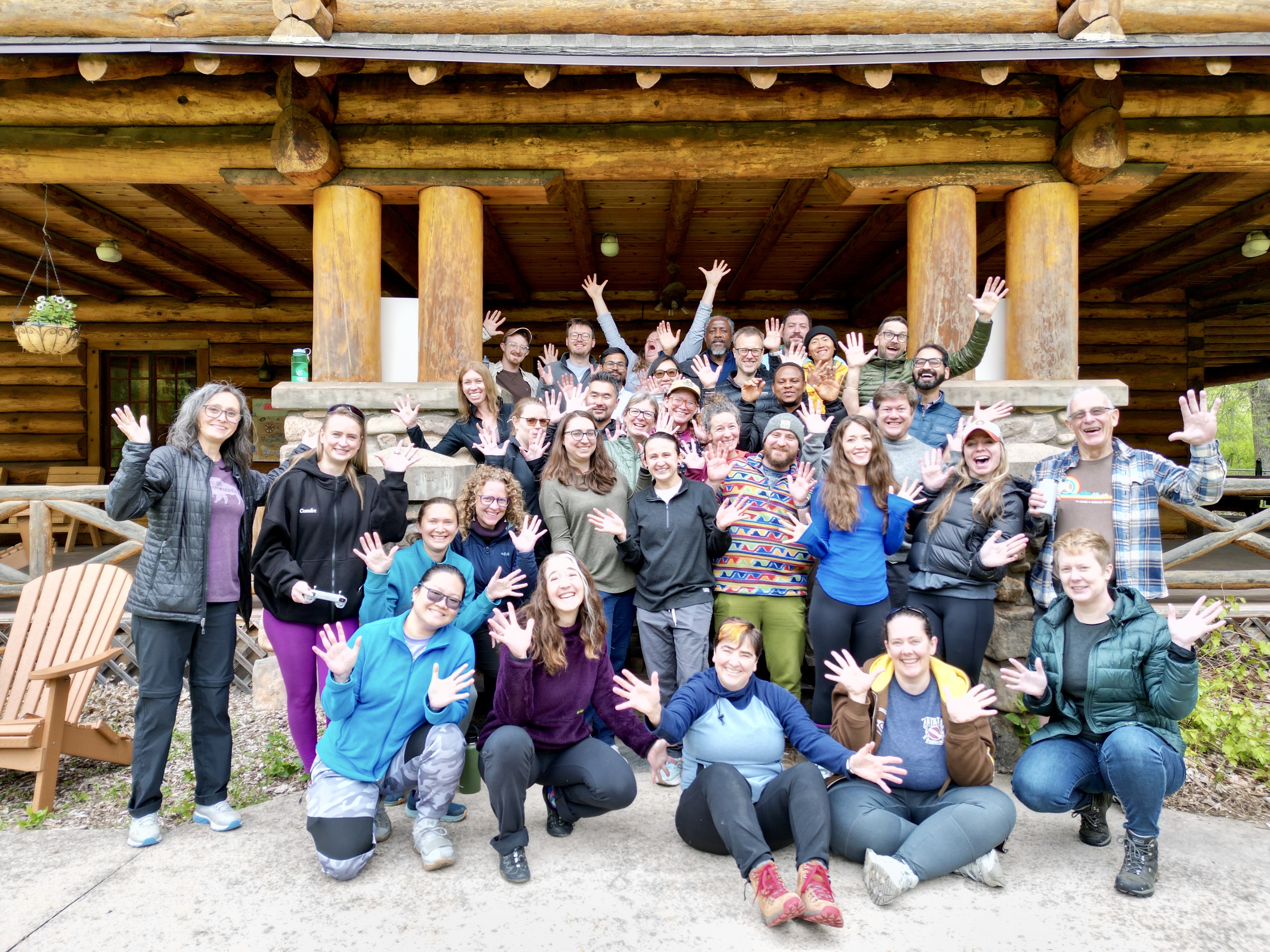May 19th to May 23rd, twenty-four UW educators and one educator from Northwest College participated in the immersive LAMP Science Initiative Summer Institute (LAMP Camp) hosted at the Historic Ranch A near Beulah, WY. All educators were recipients of the 2025-2026 LAMP Fellowship that nurtures their goals of mastering active learning strategies with an emphasis on Experiential Learning. Throughout their week together, the educators became students in purposefully designed active learning environments and designed and developed their own active learning curriculum.
The first session immersed LAMP educators in an experiential learning setting. Working first as individuals and then as teams, they experienced the Ranch A ecosystem – from the micro-aquatic to the macro-geologic. They reflected on their experiences, generated ideas, and finally proposed and performed active experimentation. This session was co-led by LAMP Director, Rachel Watson, and LAMP mentors Monia Haselhorst (Associate Professor at Colorado Mountain College), Christi Boggs (Associate Director of Online and Digital Learning at UW), Liana Boggs-Lynch (LIFE Sciences), and Amy Rhoad (LIFE Sciences).
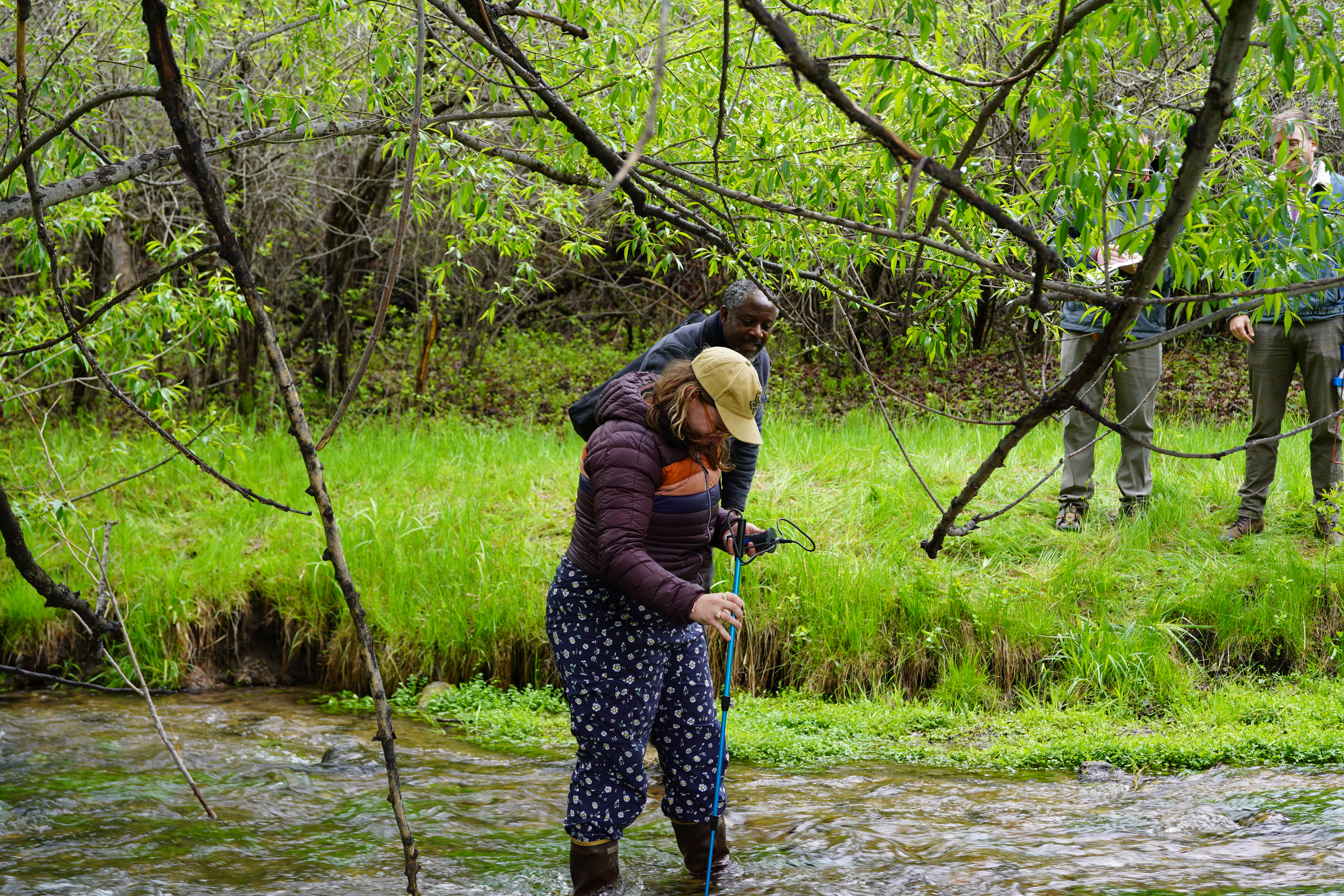 |
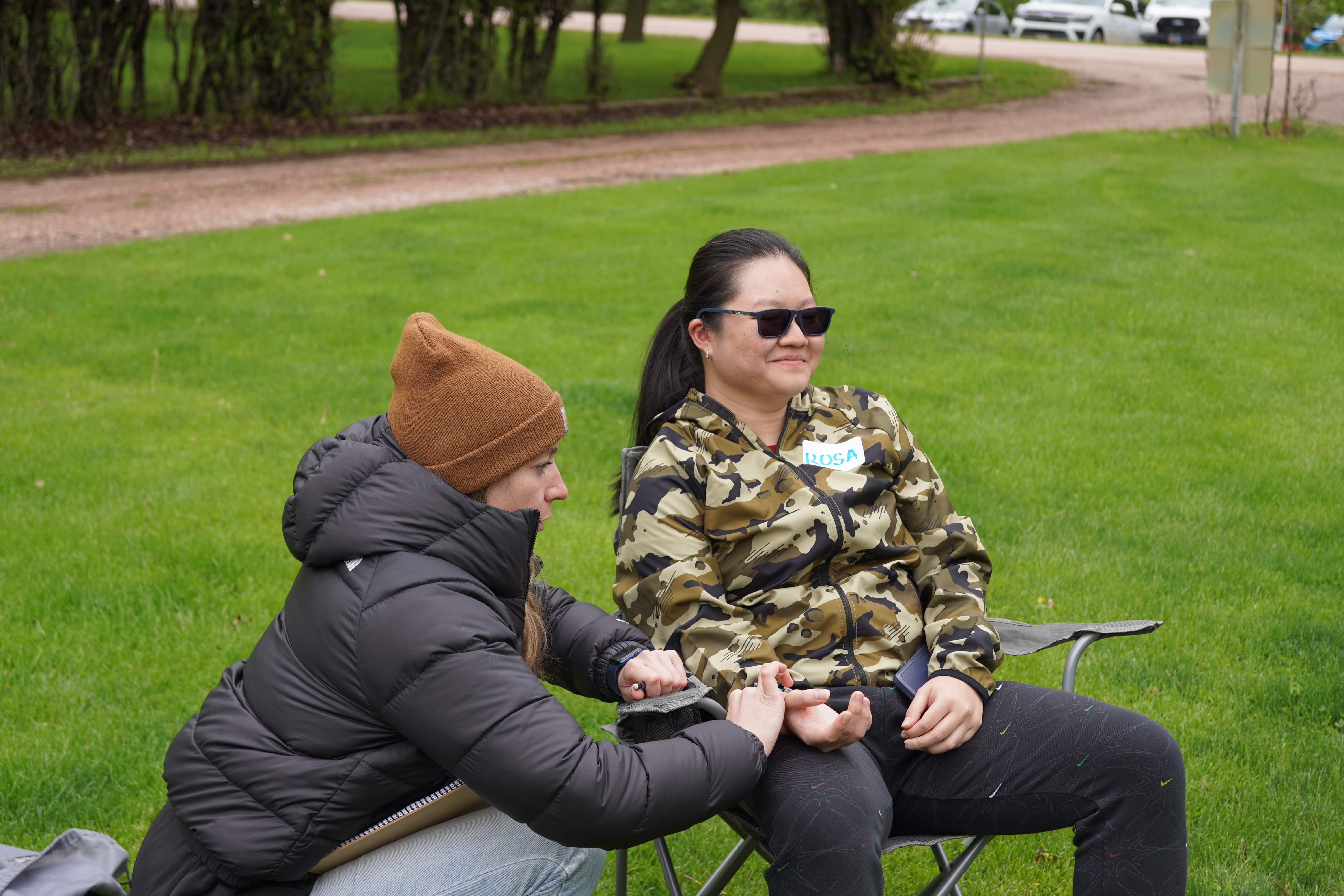 |
Paddington Hodza and Casey Black take measurements in Sand Creek, left. Frankie Genoese monitors Rosa Melindas heart rate after doing jumping jacks, right. Photo credit: Christi Boggs
“The steps of the Experiential Learning: Concrete experience, Reflection, Conceptualization and, Experimentation, invite interdisciplinary thinking. We deepened that feature by also immersing in the Science of Team Science and creating teams with scholars from variable STEM departments. This resulted in experimentation that was creative, innovative and novel. Holistically, experiential learning asks us to consider that the most impactful learning can take place outside of the classroom, without the professor as the sole source of learning, and with learners who move outside of their academic silos,” said LAMP Director, Rachel Watson.
“It was so amazing to watch these educators, many of whom are top notch researchers in their own field, dive into this activity with such excitement. They were wading in the river, examining the undergrowth, doing jumping jacks, and asking questions about insects, plants, and even asparagus. It was fun AND a great learning activity as they used their advances skills to work through the project,” said Christi Boggs (Associate Director for Online and Digital teaching, Ellbogen Center for Teaching and Learning).
During LAMP Camp, while the college educators were given the same prompt for the flow through the Kolb cycle, they proposed and performed experimentation that ranged from heart-rate tests to determine the impact of environment on recovery from both cognitive and physical tasks to identifying factors that impacted the susceptibility of choke cherry trees to parasitic mites. After sharing their projects, the educators listed the skill sets that they had to activate and practice during the process. These included everything from teamwork and measurement to coding in R Studio!
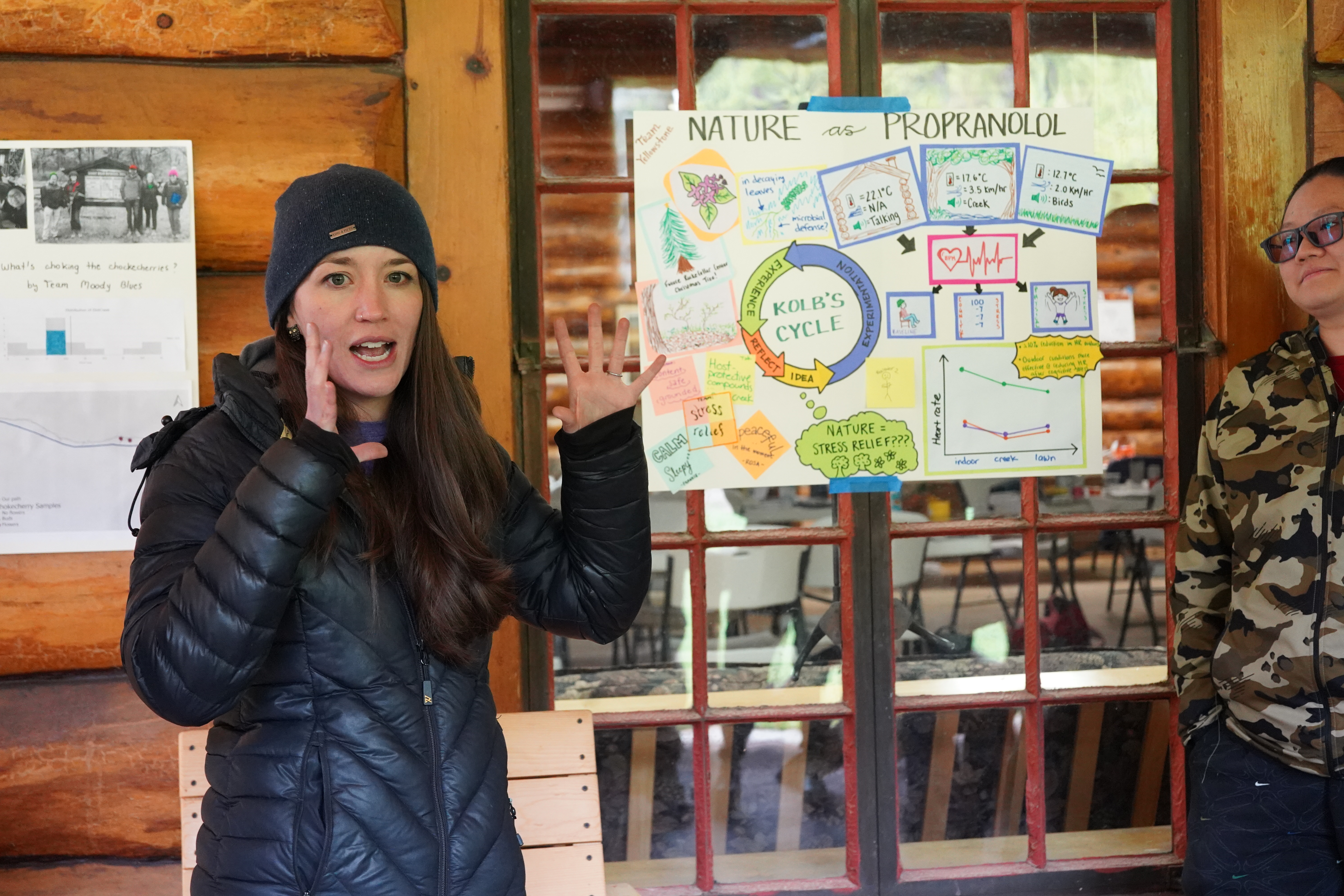 |
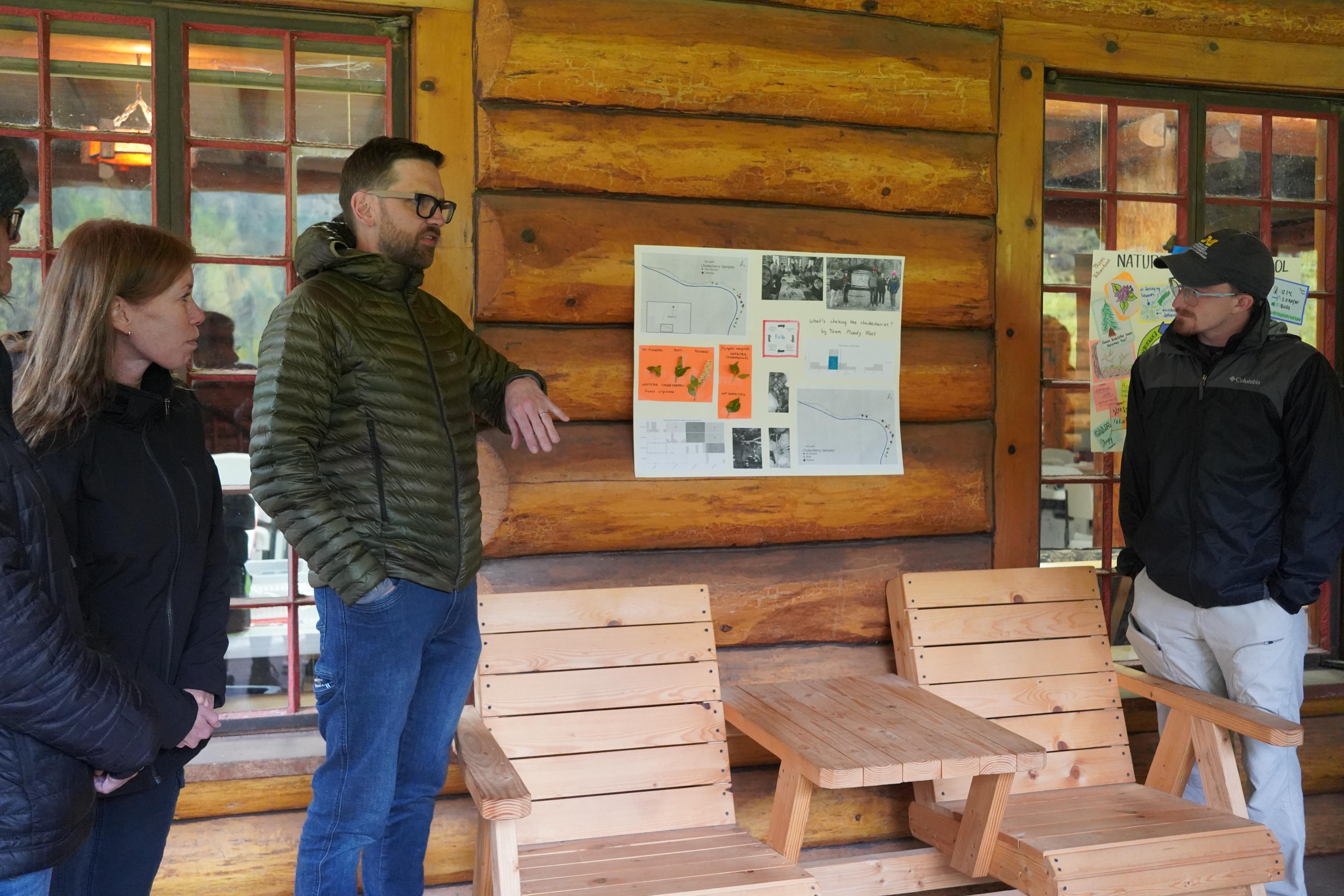 |
Sarah Pence shares her teams’ experiential learning poster, left. Evan O’Toole, Jake Hawes and Mariela Srednik share their teams’ experiential learning project, right. Photo credit: Christi Boggs
“Participating in the LAMP Summer Institute was an amazing reminder of how dynamic and engaging the learning process can be! The experiential learning activities allowed me to think creatively, collaborate with peers across disciplines, and apply a range of new and familiar skills in a fun and supportive environment. Moving forward, I plan to integrate experiential learning into my own classroom through activities that intentionally guide students through the stages of the Kolb Cycle to deepen their understanding of content, enhance critical thinking, and help them develop skills to apply course concepts beyond the classroom. I am so grateful for the new teaching strategies LAMP has provided me. They have truly strengthened my ability to design meaningful learning experiences for my students.” -Dr. Frankie Genoese (Division of Kinesiology & Health)
While also at Ranch A, educators were led through team-based learning (TBL) and object-based learning (OBL) sessions. The former was led by Martha Inouye (Science and Math Teaching Center). In this session, educators explored local weather station dashboards and considered scientific uncertainty. They came to understand what it felt like to be a learner in a TBL classroom and could name the aspects that enabled their teams to be effective. The OBL session was led by Alex Ziegler, Curator of Academic Engagement at the UW Art Museum. During this session, LAMP educators mastered skills of deep looking/observation.
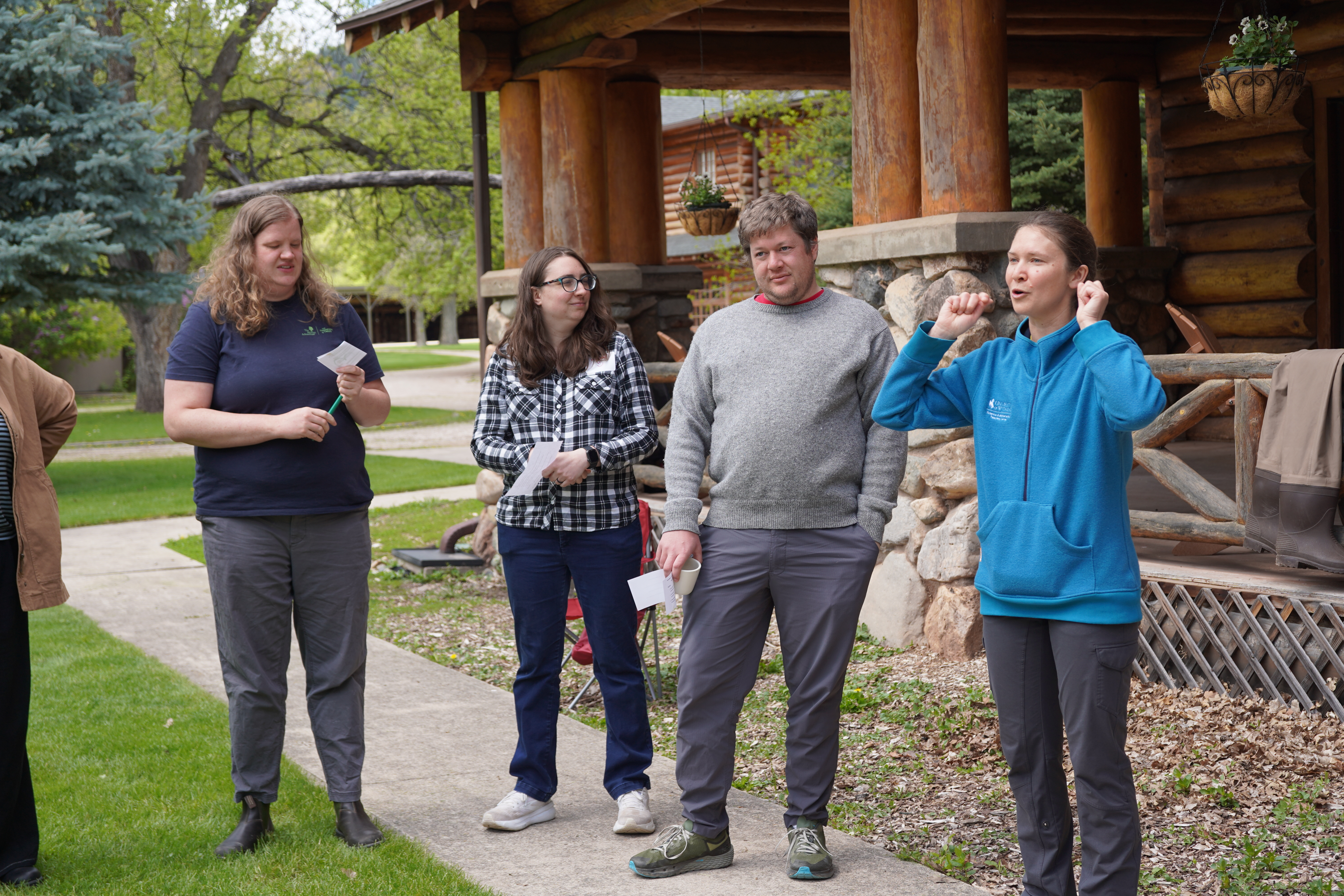
Martha Inouye with her team of faculty: Austin Conklin, Hannah Phalen and Jennifer Bell (right to left). Photo credit Christi Boggs.
“I felt truly privileged to be among so many passionate and talented educators at the LAMP Summer Institute. As a museum educator, I love collaborating interdisciplinarily, and it was a treat to be with a cohort of faculty who were so receptive and willing to experiment with new methodologies. I also learned a great deal by participating in the exercises led by LAMP mentors, and Martha’s TBL demo had so many transferable lessons to my own teaching that I’m excited to implement in the future. I enjoyed the opportunity to act as a learner myself–I left feeling deeply inspired and motivated by this community!” – Alex Ziegler
Metacognitive reflection was interlaced into every day of the Summer Institute. These reflections ranged from 1-minute papers to nature journaling in field notebooks. Janel Seeley (Director of the Ellbogen Center for Teaching and Learning) led a type of reflective dialogue called Collaborative Communication. In these late-day dialogues, educators learned to listen without reloading, ask open-ended questions, ask back, and focus on what the group had built together.
Ed Nuhfer, consultant, retired geologist, and faculty developer, led LAMP participants through synthetic sessions later in the week during which the educators tied together what they had learned in both the months of online asynchronous curriculum and at the LAMP summer institute. Ed nurtured educators’ understanding of fractal neural network development, affective domains and learners’ levels of development.
“The mentors at LAMP Camp were wonderful. We faculty learners were so fortunate to be able to witness their expertise in the science of teaching effectively and to have them as resources as we developed our own active learning methodologies to apply in our classes. Their enthusiasm for helping students learn- not simply consume- material was infectious. I am looking forward to developing my curriculum over the next academic year and having these mentors accessible will help me to improve the quality of my classes for both my students and myself. I don’t know if similar programs are available at other institutions, but it is clear we are privileged to have this opportunity at the University of Wyoming. I would highly encourage other teachers to take advantage of this program.” - Evan O’Toole
During the final days of the Summer Institute, each LAMP Fellow further developed their own instructional strategies. A process that they had begun in early April, the educators completed an informal presentation showcasing their curriculum development. These instructional strategies featured student learning outcomes, assessment strategies, and aligned active learning pedagogies. Throughout the 2025-2026 academic year, LAMP will support these instructors as they launch and assess their instructional strategies in their STEM courses.
Some example photos are below along with captions for those photos:
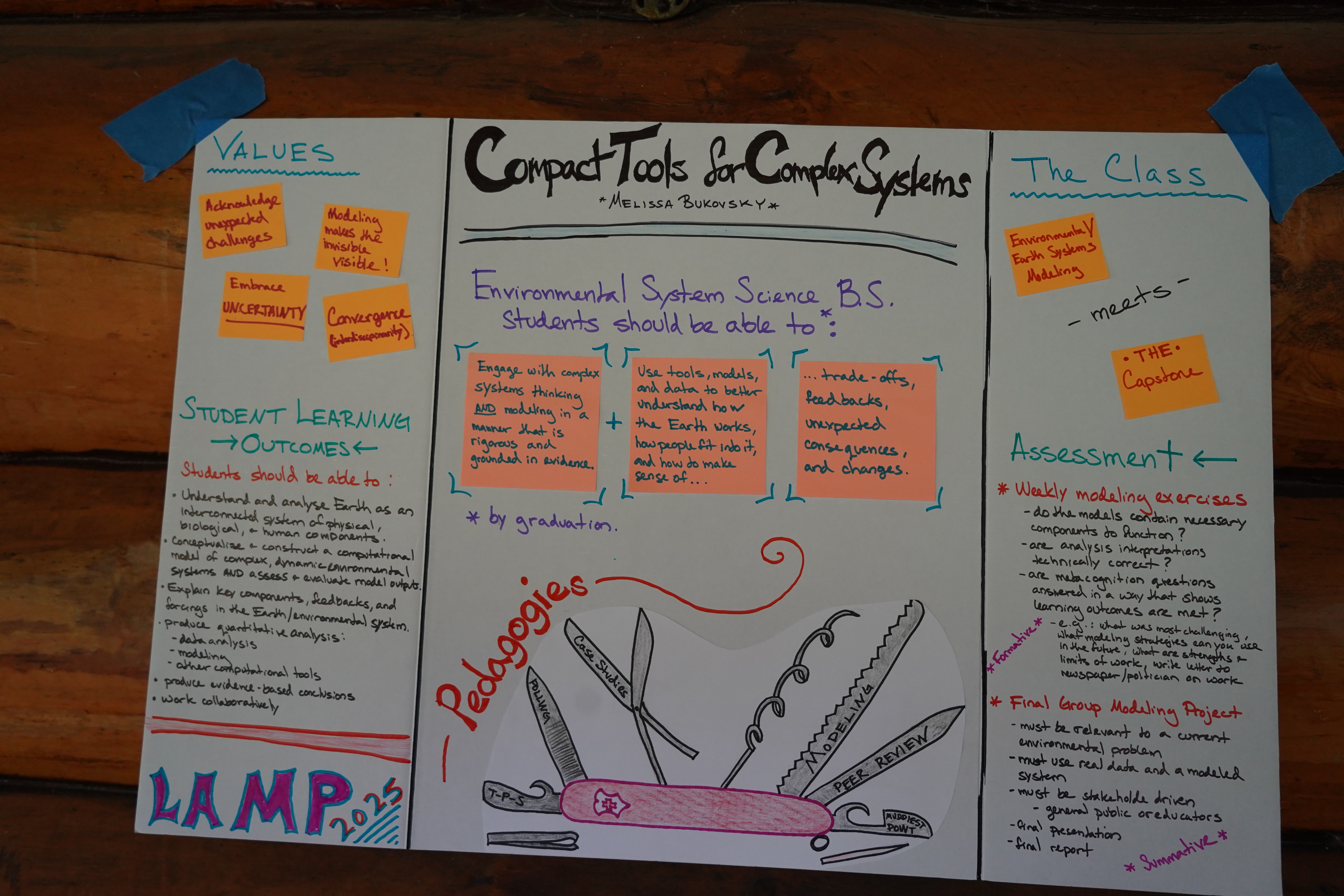 |
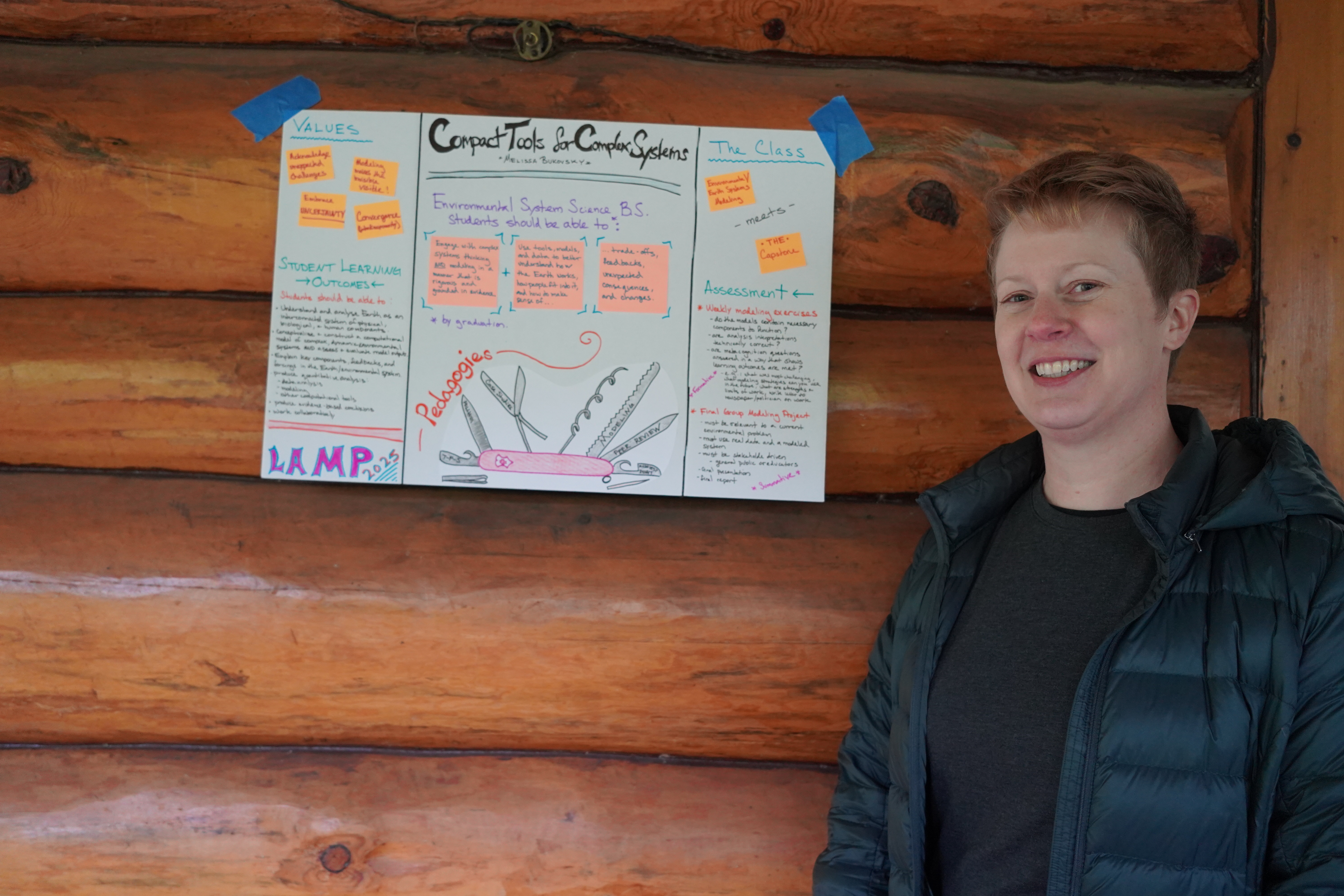 |
Melissa Bukovsky’s instructional strategy utilizes a full ‘Swiss army knife’ of pedagogies, ranging from polling to modeling and peer assessment to enable students to master her learning outcomes.
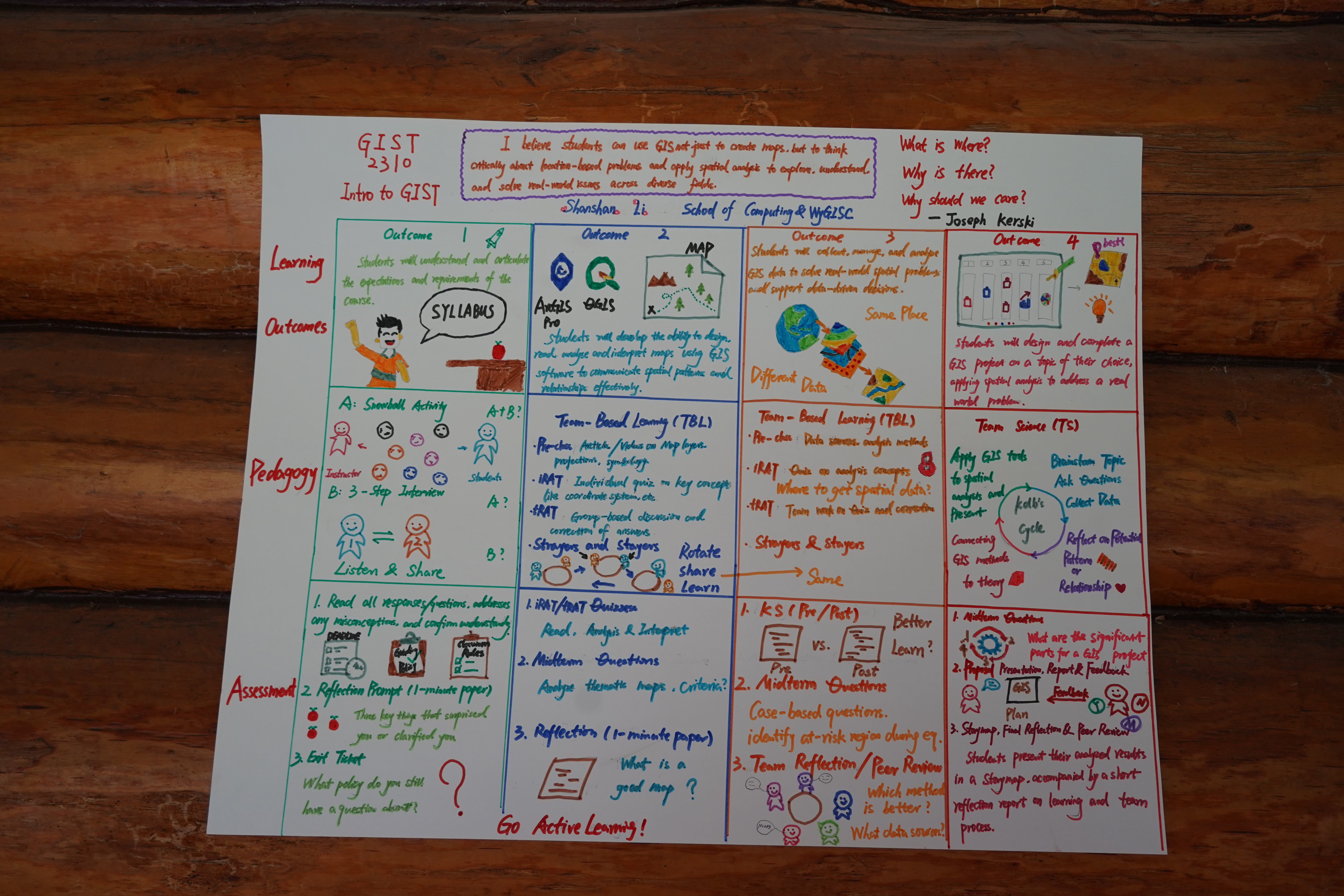 |
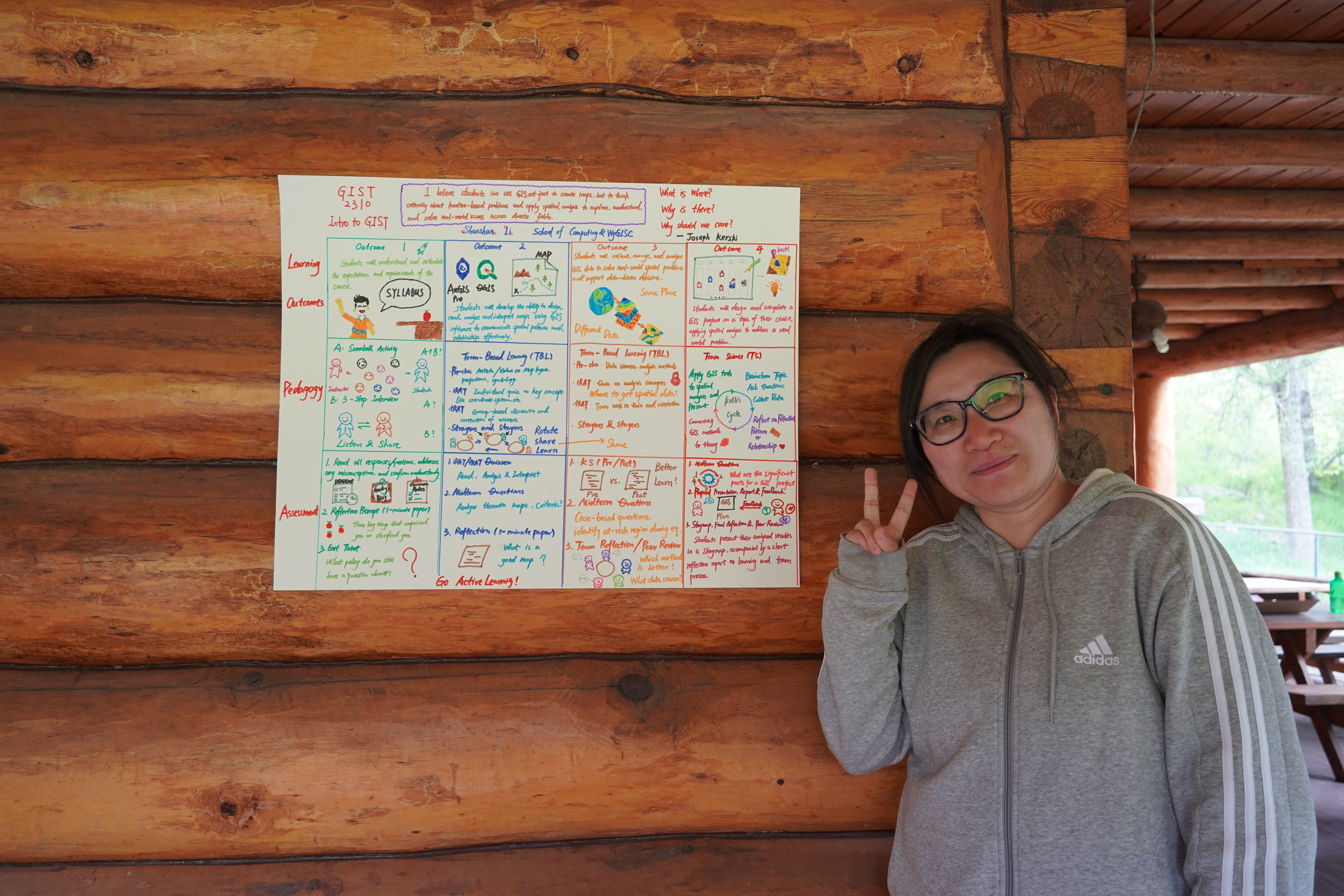 |
Shanshan Li plans to utilize Team-based learning to allow her students to realize outcomes including the skill of analyzing GIS data to solve real problems.
“Five out of five stars for LAMP Summer Institute! I found it invaluable to be able to experience teaching modalities from the perspective of the learner. I was especially impacted by the work we did in teams. I often shy away from giving my students extended group work because I remember disliking it so much as a student. LAMP camp taught me how to create the environment and to guide team activities that left me, as the student, feeling supported, connected and learning so much my brain hurt (in a happy way 🙂). I am very excited to incorporate this into my classroom!.” - Dr. Sarah Pence (School of Pharmacy)
“LAMP Camp was truly amazing! I am still thinking about it. It is changing how I approach mentoring students and how I work. Summer research is starting now, and I cannot believe how timely the LAMP Camp is, and I can already practice many of the ideas I learned on my students.” - Dr. Jian Gong (School of Computing)
LAMP Camp 2025 was featured in the UW News: https://www.uwyo.edu/news/2025/06/stem-faculty-participate-in-uw-lamp-camp-to-revolutionize-classroom-instruction.html
The instructors completing the in-person LAMP Summer Institute are below.
|
Sarah Pence |
School of Pharmacy |
|
Mariela Srednik |
Veterinary Sciences |
|
Ron Pepino |
Physics and Astronomy |
|
Hasan Iqbal |
Electrical Engineering and Computer Science |
|
Cinthia Campos-Hernandez |
Anthropology |
|
Melissa Bukovsky |
Haub School of Environment and Natural Resources |
|
Utkarsh Kapoor |
Department of Chemical and Biomedical Engineering |
|
Erin Klauk |
Science Initiative/Geology & Geophysics |
|
Shanshan Li |
School of Computing/WyGISC |
|
Jennifer Bell |
Ecosystem Science and Management |
|
Jason (Jake) Hawes |
School of Computing & Haub School |
|
Takashi (Tak) Suyama |
Chemistry Department |
|
Evan O'Toole |
Civil and Architectural Engineering and Construction Management |
|
Francesca (Frankie) Genoese |
Kinesiology and Health |
|
Ian Hammontree |
Chemical and Biomedical Engineering |
|
Leena Myran |
School of Pharmacy |
|
Austin Conklin |
STEM/Northwest College |
|
Paddington Hodza |
Wyoming Geographic Information Science Center |
|
Jian Gong |
School of Computing |
|
Hannah Phalen |
Psychology |
|
Spencer Cruz |
Zoology and Physiology / Program in Ecology and Evolution |
|
Bolaji Akorede |
Curriculum and instruction (Science education) |
|
Zach Pence |
Mathematics |
|
Casey Black |
Department of Anthropology |
|
Rosa Virginia Melinda |
Chemistry Department |
Science Initiative’s Learning Actively Mentoring Program and the Office of Online and Digital Teaching team up to offer immersive training in online active learning
June 23-27th – Twelve educators from UW, Wyoming’s community colleges, and one high school teacher participated in a weeklong intensive summer institute (LAMP/ODL e-Camp) enabling the educators to master online active learning pedagogies with an emphasis on experiential learning. The instructors became students in purposefully-designed experiential learning landscapes, engaging the first day in dispersed place-based learning in their own nearby outdoor environments. The second day, the teachers came together to engage in experiential learning in a virtual world called Second Life on an island called Genome Island.
“At first, learning how to navigate in the virtual world was confusing and disorienting to the instructors. Their avatars had to master simple skills like walking, talking and teleporting. However, with time and team collaboration, the educators used Kolb’s Experiential Learning cycle to make sense of their immersion, and they were able to complete all the steps of the Experiential Learning Cycle, sharing in-depth reflection, proposing conceptualizations and even experimentation. In fact, both teams of educators ended up proposing scholarship of teaching and learning (SoTL) studies inspired by the experiences.” Said LAMP Director, Rachel Watson
The first team, comprised of Michele Bird, Marie-Agnes Tellier (UW Mathematics and Statistics), Josh Holmes (Western Wyoming Community College Biology), Deb Jensen (Rock Springs High School Science), Duong Nguyen (UW Electrical Engineering and Computer Science), and Afsoon Kazerouni (Casper College Geology and Geophysics) proposed a study testing the hypotheses that students with technology access limitations may have less positive experiences in digitally immersive landscapes and that students with gaming technology experience may experience greater benefit when digital tools are used in classes. The second team, whose members were Juhyeon Ahn (UW Chemical and Biomedical Engineering), Ryan Goeken (Science Institute & Initiative), Billi London-Gray (UW Visual Arts), Nora Gulick (UW Division of Communication Disorders), Tracey Eckersley (UW Visual Arts) and Spencer Holtz (UW Program in Ecology and Evolution) proposed a study investigating students’ needs for instructor coaching in unfamiliar digital learning environments.
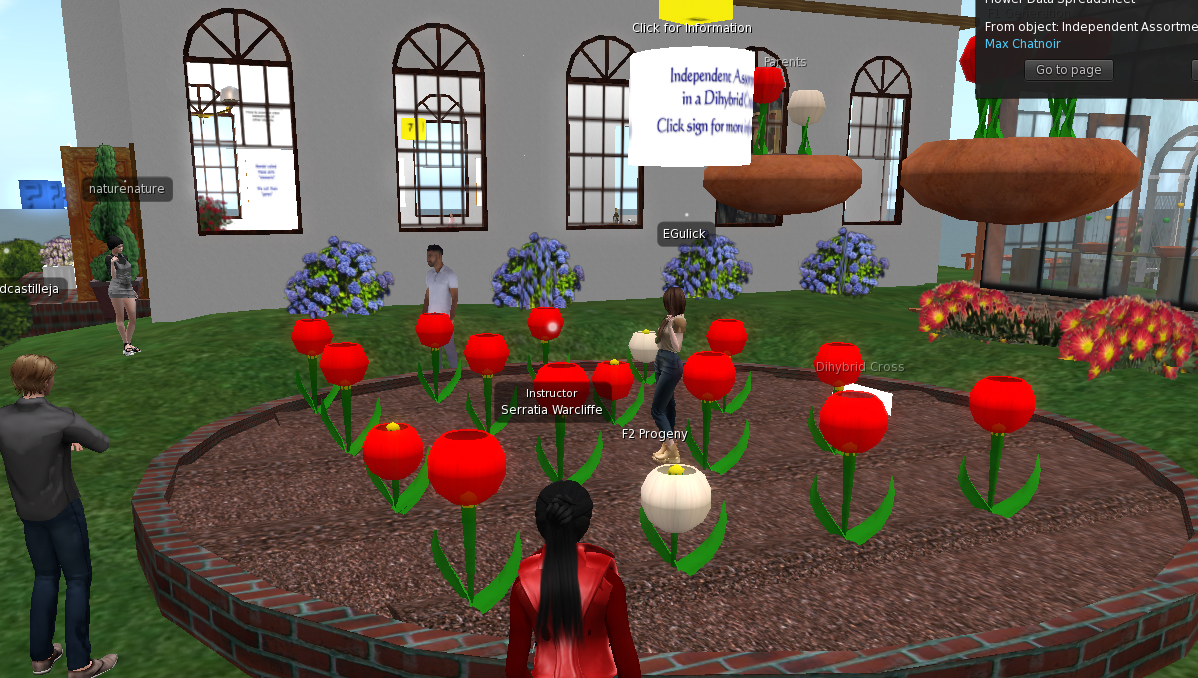
From left to right: Ryan Goeken, Juhyeon Ahn, and Nora Gulick – note – avatar in the white shirt is a Genome Island Guide
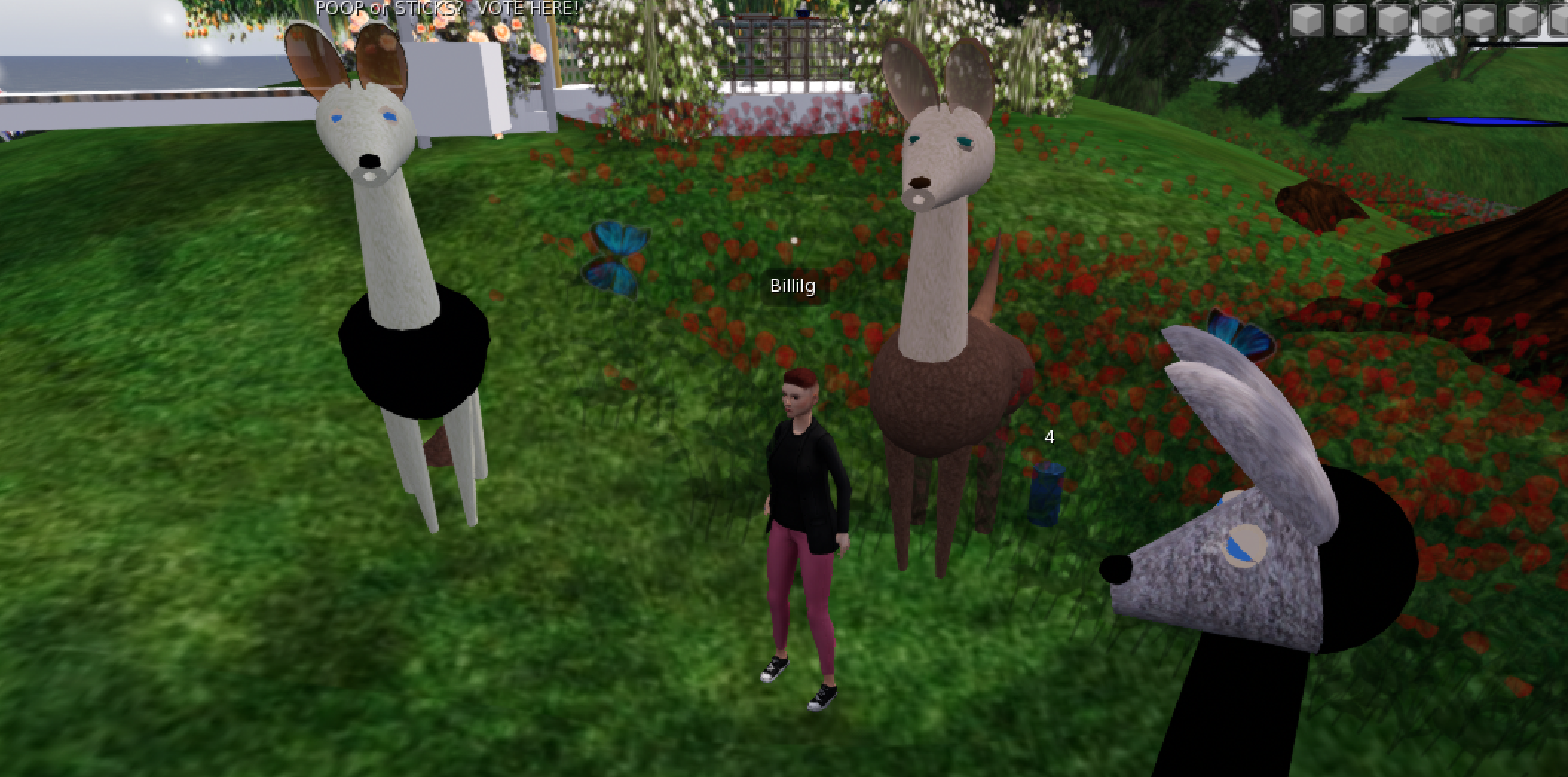 Billi London-Gray's avatar exploring the genetics of Llamas on Genome Island.
Billi London-Gray's avatar exploring the genetics of Llamas on Genome Island.
On the third day of the immersive training, the instructors experienced Team-based Learning (TBL) adapted for online courses. The goal was to allow these teachers to feel what it feels like to be a student in an online TBL class. They engaged with a mini-lecture before beginning the synchronous session, and once together, they took an individual readiness test (iRAT) and a team-readiness test (tRAT). This was followed by a team problem-solving phase called the 4Ss. These S’s stand for 1) Same problem, 2) Significant problem, 3) Single choice and 4) Simultaneous response. The significant problem taken on by the educator teams was the complexity of inorganic nanoparticles that have both many applications in everything from food preservation to biosensing and have health risks because they negatively impact the health of the gut microbiome.
After experiencing TBL, many of the instructors decided to adopt this active learning modality into their future instruction.
"Participating in TBL as the student made clear to me what components and implementation practices are most important to support all students in learning and having a positive classroom experience. I am excited to take this back to my courses in the fall to improve outcomes and experiences." Nora Gulick (UW Division of Communication Disorders)
The final two days of the Institute centered on the instructors developing active learning strategies that they will launch and assess in either their fall or spring semester courses. Throughout the week, the educators practiced metacognitive skills and learned how to imbed self-assessment into all their courses. They became able to recognize the stage of development that learners are in and use that knowledge to help guide their mentorship. Moreover, they mastered the outcome of integrating learning outcomes that not only nurture students’ mastery of skills across Bloom’s Cognitive Domains but across the Affective Domains as well. They processed their learning through daily reflective, generative dialogue that emphasized listening and asking open-ended questions.
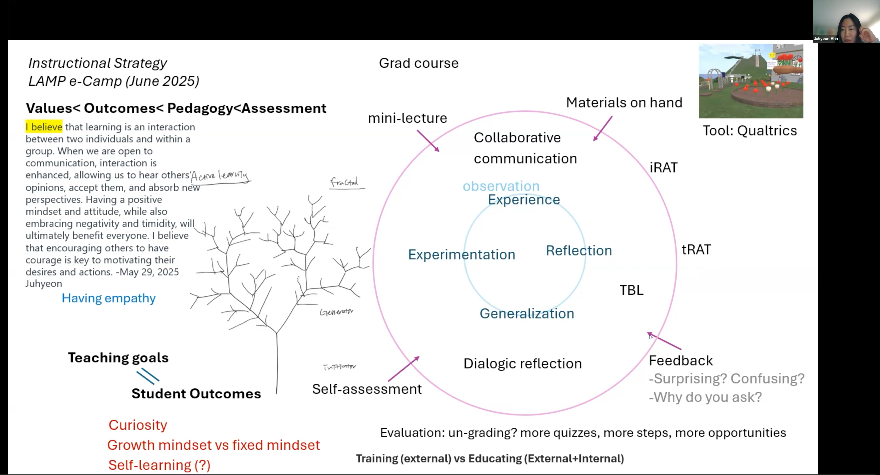 |
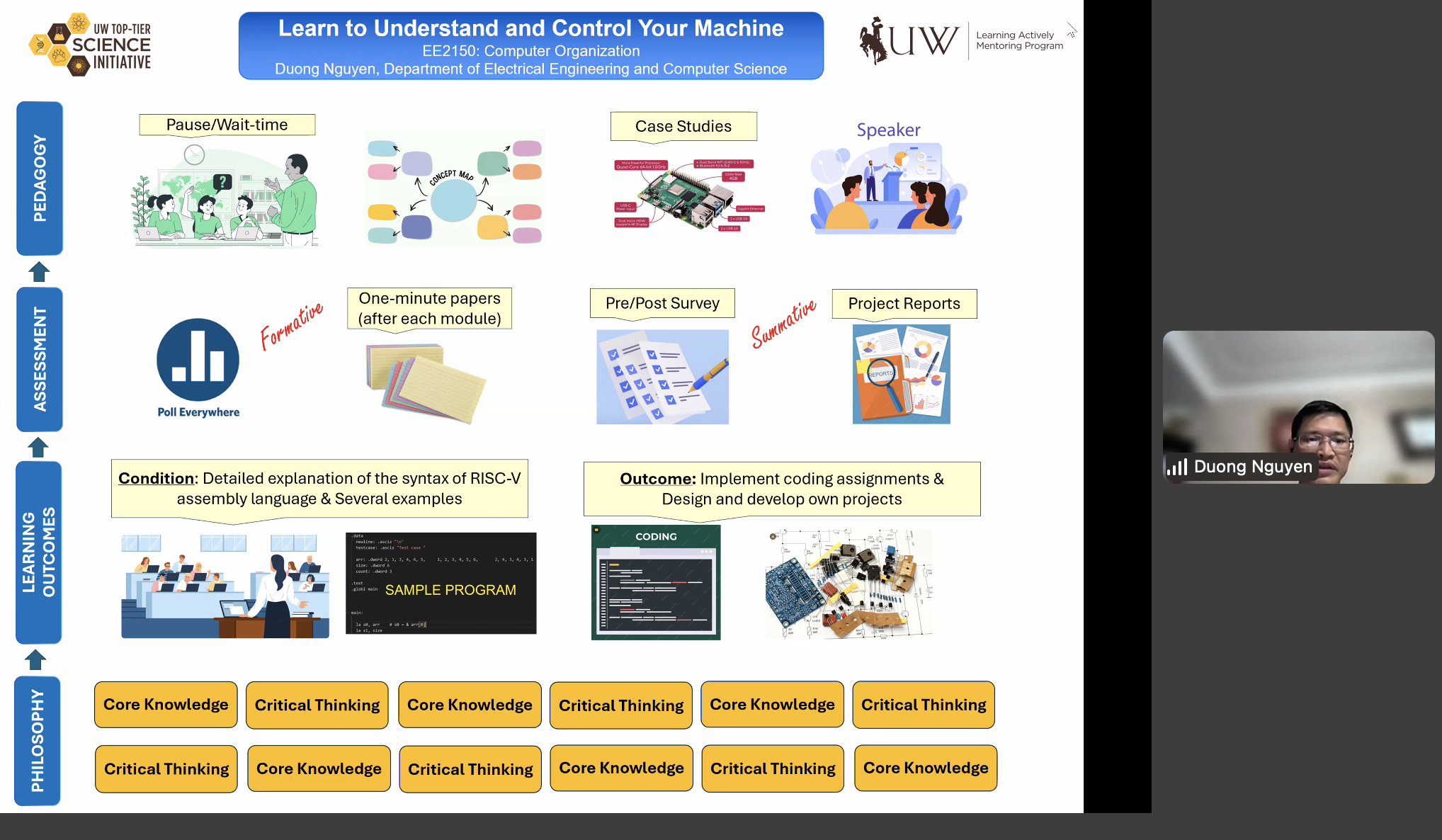 |
Juhyeon Ahn presents her poster summarizing her holistic shifts in her teaching philosophy, left. Duong Nguyen presents his poster detailing redesign of his Electrical Engineering 2150 course, right.
“I used to develop course materials primarily based on the learning outcomes listed in the syllabus. However, after attending the LAMP/ODL e-Camp, I gained a deeper perspective. First, I learned the importance of forming my teaching philosophy and sharing it with students. Doing so helps students understand not only what they are learning, but also why the material is taught in a particular way (i.e. pedagogy). Second, I realized that good intentions alone are not always enough to ensure an effective learning experience. A well-meaning instructor can face challenges in the classroom. This is why it is essential to incorporate classroom assessment techniques to gather feedback, make adjustments, and better support student learning.” Duong Nguyen
When asked what she learned from LAMP/ODL e-Camp Juhyeon Ahn said that she came to realize that, “Good teaching leads you to experience, to think, to realize, to accept, and to create.”
Mentored by Rachel Watson (LAMP Director), Christi Boggs (Associate Director for Online and Digital Teaching and Learning), Monia Haselhorst (Professor of Biological and Environmental Science at Colorado Mountain College and educational development veteran, Ed Nuhfer, the cohort of instructors came away with newfound capacity to make outrageous connections and facilitate learning environments that will enable their students to innovate and create at levels beyond expectation!
“Online & Digital Learning (ODL) was extremely pleased and honored to be partnering with LAMP to provide this incredible learning experience to more faculty. This is the perfect collaboration to bring together the innovative and effective LAMP curriculum into an online space, taking active learning and combining it with online learning. Faculty who completed this immersive training learned the best of online AND active learning.”, said ODL Associate Director of Online and Digital Learning in the Ellbogen Center for Teaching and Learning.
The ODL immersive online institute was featured in the UW News: https://www.uwyo.edu/news/2025/07/uw-launches-immersive-online-active-learning-institute.html.
|
Michele Bird |
Mathematics and Statistics |
LAMP Fellow |
|
Marie-Agnes Tellier |
Mathematics and Statistics |
LAMP Fellow |
|
Ryan Goeken |
Science Institute & Initiative |
ODL Fellow |
|
Tracey Eckersley |
Visual Arts |
ODL Fellow |
|
Billi London-Gray |
Department of Visual Arts |
ODL Fellow |
|
Juhyeon Ahn |
Chemical and Biomedical Engineering |
LAMP Fellow |
|
Spencer Holtz |
Program in Ecology and Evolution |
LAMP Fellow |
|
Eleanor (Nora) Gulick |
Division of Communication Disorders |
LAMP Fellow |
|
Duong Nguyen |
Electrical Engineering and Computer Science |
LAMP Fellow |
|
Josh Holmes |
Biological Sciences at NWC |
LAMP/Pedagogies of Innovative Excellence Fellow |
|
Afsoon Kazerouni |
Geology & Geography at Casper College |
LAMP/Pedagogies of Innovative Excellence Fellow |
|
Deb Jensen |
Rock Springs High School Science |
LAMP/Pedagogies of Innovative Excellence Fellow |

